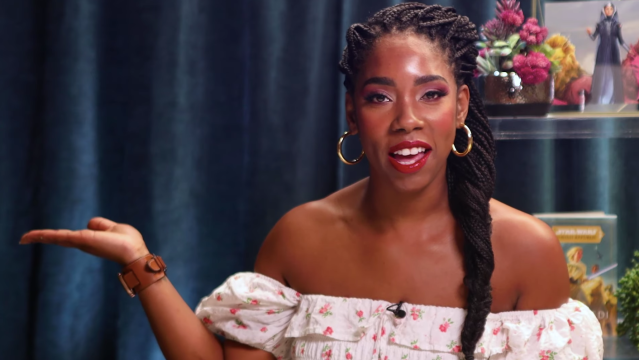During the January 4 showcase of Disney and Lucasfilm’s upcoming slate of new projects set in the era of the High Republic, Skywalker: Family at War author Kristin Baver took a moment to introduce Krystina Arielle, the new host of Star Wars: The High Republic Show. It’s a bi-monthly YouTube series delving into the details of the latest chunk of Star Wars mythos fans have been waiting to sink their teeth into.
Because of The High Republic’s overall newness to audiences, the logic behind launching a series dedicated to unpacking it made sense — as did Disney and Lucasfilm’s move to establish Arielle as one of the important faces and voices of the larger venture. But before The High Republic Show’s first episode dropped, it wasn’t long before people took to Arielle’s Twitter page in search of reasons to complain about her presence within the Star Wars business enterprise.
[referenced id=”1531994″ url=”https://gizmodo.com.au/2020/11/john-boyegas-still-fighting-the-good-star-wars-fight-and-kathleen-kennedy-is-listening/” thumb=”https://gizmodo.com.au/wp-content/uploads/2020/11/24/zn5rtfu3znkvjbcbe8zn-300×169.jpg” title=”John Boyega’s Still Fighting the Good Star Wars Fight, and Kathleen Kennedy Is Listening” excerpt=”In the early days of John Boyega’s post-Star Wars career, he almost immediately pivoted to using his platform and the extraordinary amount of focus on him to draw attention to the difficult, and often frustrating realities of being an actor of colour associated with the massively popular franchise. Beyond troll-y…”]
Specifically, a handful of trolls resurfaced and took issue with a number of Arielle’s tweets from June of 2020, in which she very plainly states some basic and easy-to-understand feelings about white people’s relationships with racism — anti-Black racism, in particular. At the time, Black Lives Matter protests across the world were drawing increasing attention to the presence and harms of systemic racism perpetuated by organisations like police departments, and everyone watched as different segments of society attempted, in different ways, to address the topic a hand.
Arielle’s tweets, which some have taken as being racist toward white people, explained her view that white people have no real place stating whether or not enough has been done to address instances of racism, whether they’re institutional or the actions of a specific person.
And stop patting them on the back for doing the bare fucking minimum task of being decent and humane to Black people
— Krystina Arielle ???? (@KrystinaArielle) June 5, 2020
Though Arielle’s tweets made a causal generalisations about white people as a whole, nothing about what she said was either incorrect or particularly incendiary considering what she’s talking about. As more and more bad actors piled onto Arielle racist harassment with purposefully incorrect interpretations of what she said, the longstanding problem of Star Wars fandom being a toxic mess became clear again.
Our Star Wars community is one of hope and inclusivity. We do not stand for bullying and racism. We support @KrystinaArielle.
— Star Wars (@starwars) January 23, 2021
While this wave of abuse aimed at Arielle went on for more than a few days, it was not long before other people began rallying around the #IStandWithKrystinaArielle hashtag, and figures associated with Star Wars, like Baver, Cavan Scott (writer of Marvel’s Star Wars: The High Republic comic), and Justina Ireland (author of the Star Wars: The High Republic: A Test of Courage YA novel) came out to express their support of Arielle.
When the main Star Wars Twitter account similarly came out in Arielle’s defence, what little hope held by trolls seeking to damage Arielle’s career was likely extinguished. But the larger problem of massive fandoms acting hostile toward Black women especially — but also women as a whole, people of colour, queer people, and anyone else not traditionally thought of as belonging within genre fandoms — still persists. What happened to Arielle is distinct from, but very closely tied to the same kinds of blowback that John Boyega, Kelly Marie Tran, and Daisy Ridley all faced for what essentially boiled down to not being white men.
In Arielle’s case, the situation is further complicated by the fact that her path to working for the Star Wars franchise — covered in an interview on StarWars.com that was released today to tie into the launch of the Star Wars: The High Republic Show — in many ways maps onto the aspirations of people within the larger Star Wars fan base, something that likely played a role in people feeling emboldened to level baseless accusations of racism against her. Petty, jealous ugliness is just as much a part of fandom toxicity as a lack of on-screen representation is. Both of these things are important pieces of a larger picture of how the fandoms that help define our shared pop culture are evolving in fits and starts, for everyone to see.
By making its stance in supporting Arielle clear, the Star Wars brand made a solid first step toward addressing this specific instance of the toxic segment of the fandom poisoning the well. We reached out to Lucasfilm asking for clarification and comment on what steps they would be taking to support creatives against attacks like this going forward, but did not receive a response by time of publishing.
It’s worth repeating, however: it’s very likely that this sort of thing will happen again. When it does, though, the brands involved need to be ready to do the right thing, by dismissing the bad actors and doing right by the creators working to help make those brands more inclusive.
The Star Wars: The High Republic Show is now streaming on YouTube.
